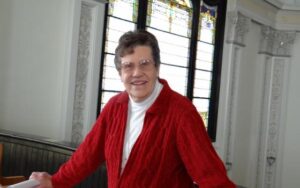Who was St. Phoebe?

St. Phoebe Prayer Service for a Synodal Church
July 3, 2023 by the Baltimore Deacon’s Circle
Colleen McCahill’s reflection following
Overheard: Paul and Phoebe have tea (a creative dialogue) and Ephesians 2:19-22
Phoebe was a woman of means–a woman of resources: spiritual resources, emotional resources, temporal resources. Phoebe had money. She was one of only five particular people Paul ever referred to as “Deacon”–including himself. Was Phoebe born for this role? What provided her the training? What provided her the background, the theology to live and serve and work and serve as a Deacon of the Church?
She owned her own home. She was a businesswoman, and a traveler. She had a network of relationships she’d developed and could draw on for her work in leading the Church into the future. But she came to her role through a path that was winding. Her wealth was also in her experience.
A couple of days ago I was at a gathering. A niece had become engaged. Her betrothed asked me about myself – What do you do? I said – I’m a Pastoral Associate at a small church in Baltimore. And he asked – What prepared you for that role?
I said – Well… I went to art school, and got a depth education in art. And after that, I worked in the theater building props and sets. After that I married and had children. And while I was doing that, I began working as a doula (my first introduction to that word) attending births at hospitals around the city where I live. And after that I went back to school and I studied theology, and then more school for more training, and though CPE, became a hospital chaplain and attended many deaths.
I tell you about this because, during my Chaplaincy training, at times I struggled to reconcile all of these aspects of self. Certainly the profound experiences of parenting, being present for so many births and deaths, studying art and theology – all these experiences have been valuable and brought perspective.
But it is really the witness of women like Phoebe that helped me most in this reconciliation. Phoebe, who began the process of defining what “Church” is because she helped to nurture it through its earliest days. Phoebe, who stepped up and brought who she was to the table of Christ.
She shows me that I am no stranger nor sojourner in my own Church. I am at home.
The small planning group here at St. Vincent’s looked together at what Scriptures would be a part of our prayers this evening.
And so, Phoebe proclaimed the first reading from today’s lectionary – because we are, after all, the Church. Some of you have already been to daily Mass. Our sisters and brothers around the world have been reading and proclaiming and reflecting on these Scriptures for at least eighteen hours (assuming an early morning Mass in Monrovia and Reykjavik). We are here, even now, in communion with these man and women of today’s Church.
And we know that our hopes and dreams, the stories of the way we practice BEING the Body of Christ, are being told in a new way, perhaps, over these past two synodal-process years.
This little bit of the letter to the Ephesians could hardly speak more eloquently to the prayers of tonight’s particular assembly: these prayers for a Church that walks together. These prayers for a re-thinking of women’s participation and leadership in that Church.
The passage is explicitly Trinitarian. Paul references Jesus the Christ and our access through him to One Spirit in the Father.
This Trinitarian understanding reminds us of the need for us to be companions to one another as Phoebe was a companion to Paul, and Paul to Phoebe. This understanding of ourselves as part of a Trinity that is in constant motion – that is God as verb – that is Church as verb – tells us about our requirement for a constant co-creation. A constant re-understanding of communion, never fixed: a living thing.
The letter further reminds us that we are in progress. It says “…through Christ the whole structure is held together, and in Christ you also are being built together into a dwelling place of God in the Spirit. …” (v 22). We are being built – we are in progress. This project is not complete.
We knew that.
If it was finished, what would we be doing here?
These words tell us that our roles and responsibilities are “…built on the foundation of the Apostles and the Prophets.” We fellow members of the household of God are called to be apostolic: sent out into the world to preach, to teach, and to heal. We are called to be prophetic: to listen and discern God’s voice, to share it, to call for growth and change and metanoia – the turning to our truest selves, to God, the way God calls us.
What about this re-thinking women’s participation in Catholic leadership and ministry? For many of us, the awareness and the conviction that women and men are both called to serve, are saved for God’s glory, beloved children of the Holy One, without partiality or distinction: this is understood. When we see Paul and Phoebe talking as compatriots, we’re not surprised.
After all, both Jesus and Paul formed working relationships and friendships with women and men from any quarter and any background. Our Gospels, written by men, nevertheless tell more stories of women (as a part of the stories of Jesus’ work and ministry) than pretty much any other writing of that place and time. Both Jesus and Paul shared their theology and spirituality and their convictions and their faith with women and men alike. And they fostered leadership among those they encountered.
As the Church was being born, then, in what we may call her childhood, women were not silent. They were not silent in the assemblies. As they are not today. They taught and led and ministered and nurtured and fostered. As they do today. They held positions of responsibility and were critical in the growth and development of the Christian mission. As we must today. Their initiative and creativity was honored. And it was necessary. AS it is today. Then and now, they were no longer strangers, but fellow citizens and members of the household of God.
And to remember: the word “fellow” is etymologically non-gendered. It is always appropriate to use it for a company of women, or women and men, or any company. How wonderful to have this word, which speaks so well to the kind of companionship and accompaniment to which we are called in the Christian venture.
You heard our unseen observer [to Paul and Phoebe’s conversation over tea] mention John Chrysostom, bishop of Constantinople at the end of the fourth century and beginning of the fifth. He preached on the bravery and sacred work of the women of the early Church. Of Phoebe, Chrysostom preached: “It is no slight thing to be called a sister of Paul. And Paul added to her, by mentioning that she was a diakonos.”
“The women of those days,” Chrysostom preached, “were more spirited than lions, sharing with the other apostles their labors for the sake of the Good News.”
Our childhoods affect our beliefs and our practices for a lifetime. The Church knows, from her earliest days, from her very foundation, through all the accretions and encrustations of generations, centuries of rite and ritual, accrued customs and practices, Who She is. She knows where her roots are.
When our planning group began to conceive of this prayer service, we imagined that today, in resonance with Paul and Phoebe’s time together, I might speak as Lydia – another woman of the early Church.
I did feel it was important to bring us together through time from Paul and Phoebe to now. From the Church in her youngest moments to the Church of today – which is still a Church on the way “…being built into that dwelling place.”
Lydia was like Phoebe, though she met Paul before Phoebe did. We read of Lydia in the Book of Acts. She was also a businesswoman. And importantly, she was a “seller of purple.” Her network of companions were those who could afford to buy the richest cloth around. Lydia established, with Paul, the first Christian community in what is now Greece.
Had I been speaking as Lydia, I would have worn purple, as a Lydia who was as good as her product. Like Phoebe, Lydia came to her role as a leader in the Church via the lived experience of a varied background. The networking and relationships these women had cultivated made them ready to bring the Christian message into the world – as do our networks, our lived experiences, our relationships, hopes and prayers and our participation today.
Paul said to Phoebe: Phoebe, you give me hope. And she replied: Are we not all challenged to step up and help when the need presents itself?
Only a few sentences before the passage that we heard today, the letter to the Ephesians reminds us that “…we are God’s handiwork. We are created in Christ Jesus for the good works that God has prepared that we should live them.”
So, though I do not speak as Lydia, I feel her presence here. I feel the presence of Paul and Phoebe, along with your presence, here in church and from all of your home-churches via Zoom. In solidarity with these women who demonstrated servant-leadership, with those who strive for the continued preaching and proclaiming of the Good News of God, I will wear purple. And I will pray: Let me also step up. Let me help as the need presents itself. Lydia is here. Phoebe is here. We are here, no longer strangers nor sojourners, being built together into a dwelling place of God.

Colleen McCahill
Colleen is the Pastoral Associate for the wonderful people at St. Vincent de Paul Church in Baltimore, MD. She is married with four adult children and a son-in-law. She received her BFA from the Maryland Institute College of Art, and MAs in Theology and in Church Ministries from St. Mary’s Ecumenical Institute. She likes to see and learn new things, schmooze and plan, encounter the Holy in unexpected places, cook, dance, and hike in the woods.


